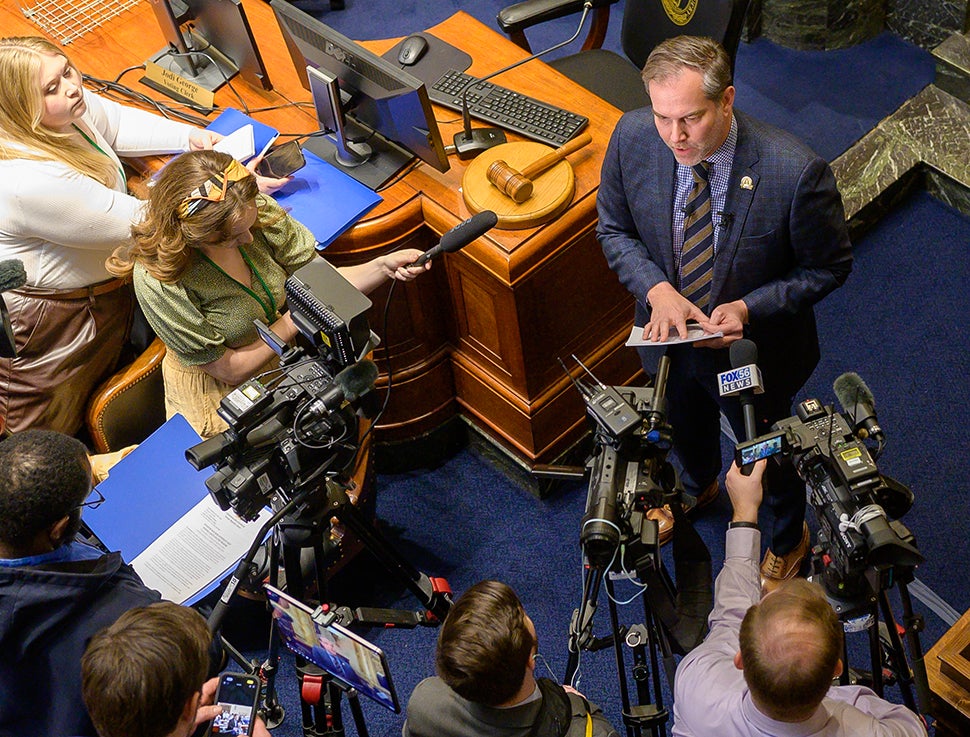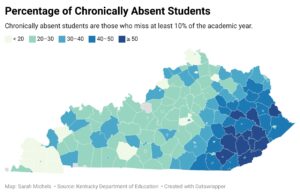School safety, truancy and JCPS: Education committees tackle several issues
Published 2:31 pm Tuesday, March 26, 2024

- FRANKFORT, Feb. 22 – Sen. Max Wise, R-Campbellsville, is surrounded by media Thursday as he fields questions on Senate Bill 2, legislation focused on school safety. (LRC Public Information)
FRANKFORT — Tuesday was a big day for education bills at the Capitol.
House and Senate education committees approved bills addressing school safety, truancy and JCPS.
School safety
This year’s update to 2019’s School Safety and Resiliency Act continues to progress. Tuesday, the House Education committee passed it 14-3.
The bill is a “stopgap” measure for school districts that have been unable to meet the 2019 law’s requirement for one school resource officer per school campus, said sponsor Sen. Max Wise, R-Campbellsville.
It would allow so-called guardians – honorably discharged veterans, retired Kentucky state troopers, retired special and sworn law enforcement officers and former federal law enforcement officers – to support current SROs or serve in a temporary safety role until districts can find SROs.
Guardians have to complete 160 hours of training. They cannot arrest anyone, but can carry a gun.
In contrast, SROs have 80 additional hours of training, arresting authority and have to talk to the Center for School Safety and the School Safety Marshal before being approved.
The bill—Senate Bill 2—also would require schools to create trauma-informed teams made up of school mental health professionals and SROs to identify and help students whose learning, behavior or relationships have been impacted by trauma.
Districts would have to report on the state of mental health to give the legislature a better idea of what Kentucky students are facing.
The latest version of the bill gives the Kentucky Center for School Safety more oversight over the guardian program. It would require districts to have memorandums of understanding with local and state law enforcement to establish protocols in cases of emergency.
The amended version grants local school boards civil and criminal immunity from the actions of a guardian, while guardians have the same civil immunity as other law enforcement officers.
Rep. Lisa Willner, D-Louisville, was not a fan of this addition.
“‘I’m worried that this guardians program, that it’s an accident waiting to happen,” she said.
Rep. Josh Calloway, R-Irvington, filed a successful amendment to SB2, which would allow licensed pastoral counselors to be part of trauma-informed teams. Pastoral counselors are ordained ministers or the equivalent from other denominations with an advanced degree in divinity and pastoral counseling.
Rep. Steve Riley, R-Glasgow, said the amendment was a surprise Tuesday morning, and that while some pastors would be good fits, others might not.
A pair of community members testified against the bill—Anderson County resident Teri Carter and Moms Demand Action for Gun Sense volunteer Cathy Hobart.
Carter said she’s been talking to members of her rural county about the bill, and nobody likes it.
“It seems like we’re throwing things at the wall,” she said. “You know, just anybody in the school with a gun would be great. Just any counselor in the school would be great.”
Hobart said school shootings are “exceedingly rare”—Kentucky hasn’t had one since the 2018 Marshall County shooting—but that students experience trauma at home and in school requiring mental health services much more often.
“I think that armed guards in our schools will give many people the illusion of safety, but there is no evidence that they actually provide any safety,” she said.
Truancy
Kentucky is facing a chronic absenteeism crisis.
House Bill 611 would add some teeth to Kentucky truancy laws, requiring schools’ directors of pupil personnel to report students who miss school for 15 days or more without an excused absence to the county attorney.

According to Kentucky Department of Education data, 29% of Kentucky public school students were deemed chronically absent during the 2022-23 academic year.
Higher rates of chronic absenteeism are concentrated in Eastern Kentucky, where some districts have over half of their student body considered chronically absent.
The attorney would work with the parent or student, depending on the grade, to determine appropriate court intervention. This might be a diversion agreement, which typically involve a family accountability, intervention and response team made up of law enforcement, school personnel, social workers and mental health support.
FAIR teams currently have 90 days to take action on a child’s case. This bill would lower that to 30 days. It would also extend the length of diversion programs from six months to a year to track students longer.
During the diversion period, if a child misses an additional four unexcused days, they will immediately be referred to the county attorney again, who then would pursue formal court action.
Rep. Jared Bauman, R-Louisville, said they would prefer less than 15 days, but county attorneys have expressed a lower threshold may lead to an overwhelming caseload.
“These kids are not in school with their peers, learning, socializing, where they should be as children so they can become the next generation of Kentuckians that are going to be contributing to our society,” Bauman said.
Rep. Timmy Truett, R-McKee, said if FAIR teams are working, there will be no need for this bill. However, not all are working, and this would provide “consistency” across the state.
Efficient and Effective School District Taskforce
Rep. Ken Fleming, R-Louisville, is sponsoring House Concurrent Resolution 81, which would establish the Efficient and Effective School District Governance Task Force.
While Jefferson County Public Schools is not explicitly named in the resolution, it only includes school districts with over 75,000 students. JCPS is the only district meeting that criteria.
Fleming said the task force’s goal is to consult experts, research and the public on how to address multiple challenges, including widening achievement gaps, transportation issues, teacher and student safety and a teacher shortage.
“We do not want to take a knee jerk reaction to address issues facing this district,” Fleming said.
The task force would review at least 17 areas, including district governance, size, efficiency, performance audits and potential restructuring impact on various areas.





